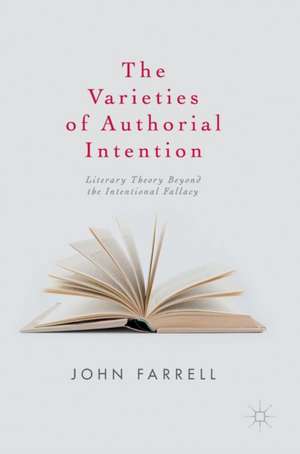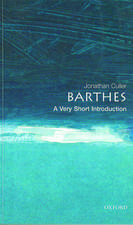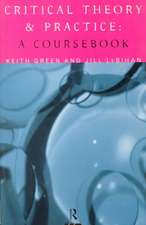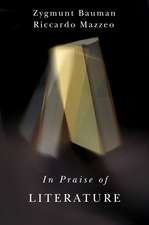The Varieties of Authorial Intention: Literary Theory Beyond the Intentional Fallacy
Autor John Farrellen Limba Engleză Hardback – 26 mar 2017
| Toate formatele și edițiile | Preț | Express |
|---|---|---|
| Paperback (1) | 213.97 lei 6-8 săpt. | |
| Springer International Publishing – 19 iul 2018 | 213.97 lei 6-8 săpt. | |
| Hardback (1) | 535.10 lei 39-44 zile | |
| Springer – 26 mar 2017 | 535.10 lei 39-44 zile |
Preț: 535.10 lei
Preț vechi: 581.64 lei
-8% Nou
Puncte Express: 803
Preț estimativ în valută:
102.39€ • 109.49$ • 85.37£
102.39€ • 109.49$ • 85.37£
Carte tipărită la comandă
Livrare economică 14-19 aprilie
Preluare comenzi: 021 569.72.76
Specificații
ISBN-13: 9783319489766
ISBN-10: 3319489763
Pagini: 263
Dimensiuni: 148 x 210 x 21 mm
Greutate: 0.5 kg
Ediția:1st ed. 2017
Editura: Springer
Colecția Palgrave Macmillan
Locul publicării:Cham, Switzerland
ISBN-10: 3319489763
Pagini: 263
Dimensiuni: 148 x 210 x 21 mm
Greutate: 0.5 kg
Ediția:1st ed. 2017
Editura: Springer
Colecția Palgrave Macmillan
Locul publicării:Cham, Switzerland
Cuprins
Preface.- Introduction: The Origins of an Intellectual Taboo.- Chapter One: Actions, Intentions, Authors, Works.- Chapter Two: Uncertainty, Indeterminacy, Omniscience, and Other Matters.- Chapter Three: Unconscious Intentions.- Chapter Four: Authorship and Literary Value.- Conclusion.-
Recenzii
“The Varieties of Authorial Intention is a book that literary scholars of every specialization would benefit from reading. It is one of the most down-to-earth and sensible books ever written about the study of literature. By exposing the contradictions and incoherence created by proponents of the textual fallacy, Farrell clears the way for a major improvement in the quality of thought in English departments.” (Leonard Neidorf, Studia Neophilologica, December, 2017)
Notă biografică
John Farrell is Professor of Literature at Claremont McKenna College, USA. He is also the author of Paranoia and Modernity and Freud’s Paranoid Quest.
Textul de pe ultima copertă
This book explores the logic and historical origins of a strange taboo that has haunted literary critics since the 1940s, keeping them from referring to the intentions of authors without apology. The taboo was enforced by a seminal article, “The Intentional Fallacy,” and it deepened during the era of poststructuralist theory. Even now, when the vocabulary of “critique” that has dominated the literary field is under sweeping revision, the matter of authorial intention has yet to be reconsidered. This work explains how “The Intentional Fallacy” confused different kinds of authorial intentions and how literary critics can benefit from a more up-to-date understanding of intentionality in language. The result is a challenging inventory of the resources of literary theory, including implied readers, poetic speakers, omniscient narrators, interpretive communities, linguistic indeterminacy, unconscious meaning, literary value, and the nature of literature itself.
Caracteristici
Readdresses a subject that, since the 1940s, has been largely avoided/skated over: that of authorial intention
Presents compact treatments of the conceptual background that literary scholars need to understand why they can’t and shouldn’t try to do without authors
Gestures towards the connection between the issue of authorial intention and modern problems of agency and critique
Presents compact treatments of the conceptual background that literary scholars need to understand why they can’t and shouldn’t try to do without authors
Gestures towards the connection between the issue of authorial intention and modern problems of agency and critique














